In its war on terrorism in Yemen, the US government describes Yemen as "an important partner in the global war on terrorism". There have been attacks on civilian targets and tourists, and there was a cargo-plane bomb plot in 2010. Counter-terrorism operations have been conducted by the Yemeni police, the Yemeni military, and the United States Armed Forces.
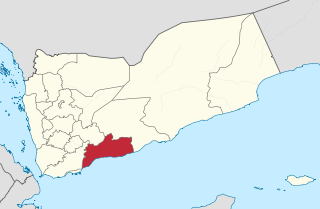
Abyan is a governorate of Yemen. The Abyan region was historically part of the Fadhli Sultanate. It was a base to the Aden-Abyan Islamic Army militant group. Its capital is the city of Zinjibar. This governorate is noted for its agriculture, in particular the cultivation of date palms and animal husbandry.
Zinjibar is a port and coastal town in south-central Yemen, the capital of Zinjibar District and the Abyan Governorate. It is located next to the Wadi Bana in the Abyan Delta. From 1962 to 1967, it was the administrative capital of the Fadhli Sultanate, although the royal residence remained at the former capital of Shuqrah. At the time of the 2004 census, Zinjibar's population numbered 19,879 inhabitants. The town supports a small seaside resort and fishing industry. Cotton grown in the area is brokered in the market.

Al-Qaeda in the Arabian Peninsula, abbreviated as AQAP, also known as Ansar al-Sharia in Yemen, is a militant Sunni Islamist terrorist group primarily active in Yemen and Saudi Arabia that is part of the al-Qaeda network. It is considered the most active of al-Qaeda's branches that emerged after the weakening of central leadership. The U.S. government believes AQAP to be the most dangerous al-Qaeda branch. The group established an emirate during the 2011 Yemeni Revolution, which waned in power after foreign interventions in the subsequent Yemeni Civil War.

Jaʽar is a small town and capital of Khanfir District in south-western Yemen. One of the largest settlements in the Abyan Governorate, it is located in the south of the Abyan Governorate to the north of Al Kawd and the regional capital of Zinjibar. The town is located about 2 kilometres east of the right bank of the Wadi Bana.

The South Yemen insurgency was a series of protests and attacks on government forces in southern Yemen between 2009 and 2014. Although the violence was blamed on elements within the southern secessionist movement, leaders of the group maintained that their aims of independence were to be achieved through peaceful means, and claimed that attacks were from ordinary citizens in response to the government's provocative actions.

The Al-Qaeda insurgency in Yemen is an ongoing armed conflict between the Yemeni government, United States, and al-Qaeda-affiliated cells in Yemen. It is a part of the Global War on Terror.
The Battle of Zinjibar was a battle between forces loyal to Yemeni leader Ali Abdullah Saleh and Islamist militant forces, possibly including elements of al-Qaeda in the Arabian Peninsula (AQAP), for control of the town of Zinjibar and its surroundings as part of the wider insurgency in the self-declared Al-Qaeda Emirate in Yemen. Many of the Islamist forces operating in Abyan province refer to themselves as Ansar al-Sharia.

The 2012 Abyan offensive was an offensive by the Yemeni military against Islamist militant forces, possibly including elements of Al-Qaeda in the Arabian Peninsula (AQAP), in the province of Abyan with the purpose of re-capturing the militant-held towns of Zinjibar and Jaʿār.
The following lists events that happened during 2012 in Yemen.
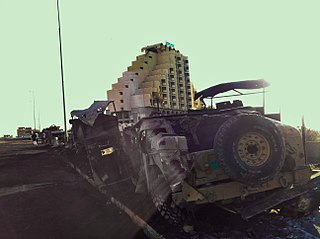
The Fall of Mosul occurred between 4–10 June 2014, when Islamic State insurgents, initially led by Abu Abdulrahman al-Bilawi, captured Mosul from the Iraqi Army, led by Lieutenant General Mahdi Al-Gharrawi.
United States drone strikes in Yemen started after the September 11, 2001 attacks in the United States, when the US military attacked Islamist militant presence in Yemen, in particular Al-Qaeda in the Arabian Peninsula using drone warfare.
The Timeline of the Yemeni Crisis (2011–present) refers to events of the Houthi insurgency in Yemen, the Yemeni Revolution, the Al-Qaeda insurgency in Yemen and the South Yemen insurgency.

The Abyan campaign was a campaign for control of the Abyan Governorate of Yemen, between the Houthis and Yemen Army units loyal to Ali Abdullah Saleh on one side, and militiamen and Yemen Army units loyal to Abd Rabbuh Mansur Hadi on the other side, supported by jihadists of al-Qaeda in the Arabian Peninsula. The Pro-Hadi Forces recaptured the Abyan Governorate on 11 August, after launching an offensive on pro-Houthi forces in early August.
In early December 2015, two Yemeni towns, Zinjibar and Ja'ar, were captured by the jihadist group Al-Qaeda in the Arabian Peninsula (AQAP). This was the second capture and occupation of Zinjibar during unrest in Yemen. The town was earlier taken by AQAP’s in May 2011 and held until the summer of 2012.
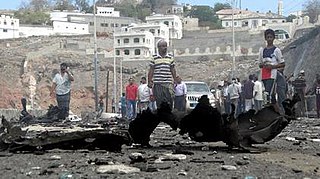
The Aden unrest refers to initially ongoing conflict between Islamist factions, such as al-Qaeda in the Arabian Peninsula, and Islamic State of Iraq and the Levant's Yemen Branch, against the loyalists of president Abd Rabbuh Mansur Hadi and later to conflict between UAE-backed and Saudi-backed factions within the coalition. In 2017, fighting also broke out between factions aligned with different members of the Saudi-led coalition namely Saudi Arabia-backed Abdrabbuh Mansur Hadi and Al-Islah and UAE-backed separatist Southern Transitional Council and Southern Movement.
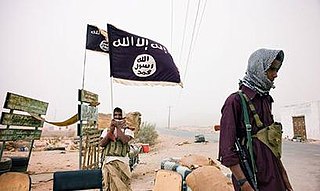
The Shabwah Governorate offensive is an insurgent campaign by Al-Qaeda in the Arabian Peninsula (AQAP) forces to take control of Shabwah Governorate during the Yemeni Civil War.
The following is a timeline of the Second Yemeni Civil War, which began in September 2014.
The Hadramaut insurgency was an insurgency in Yemen launched by AQAP and ISIL-YP against forces loyal to president Abdrabbuh Mansur Hadi.
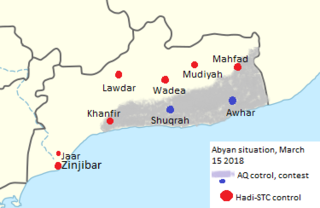
The Abyan conflict was a series of clashes between forces of AQAP loyal to Yemeni president Abdrabbuh Mansur Hadi, and forces loyal to Southern Movement for the control of Abyan.








